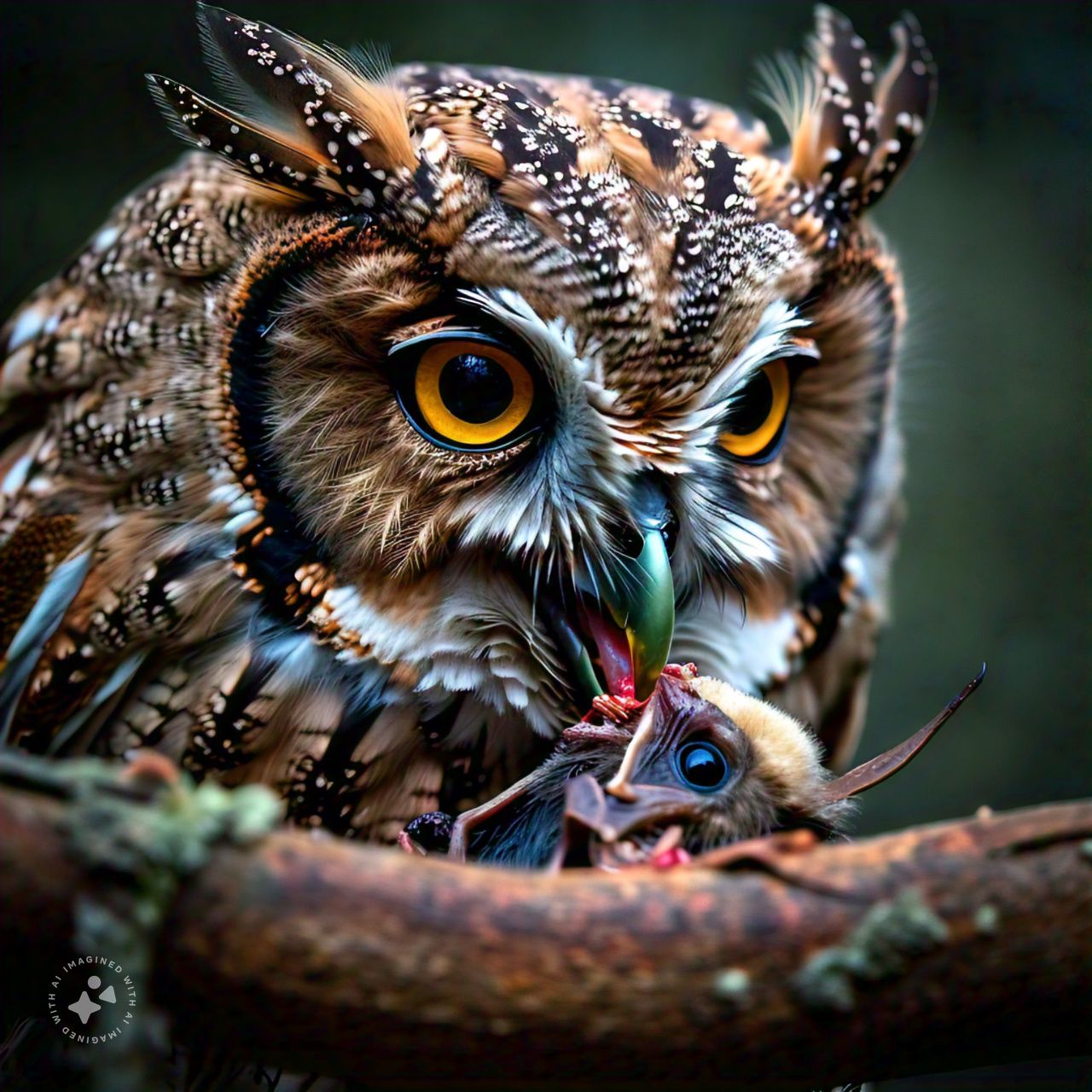Do Owls Eat Bats? Understanding an Owl’s Diet and Hunting Habits
Owls are fascinating birds of prey with varied diets, known for their adaptability in hunting. While small mammals, insects, and reptiles make up a significant part of their diet, some species of owls are also known to hunt bats. In this article, we’ll explore whether owls eat bats, how they hunt these elusive creatures, and how their dietary habits contribute to their survival in the wild.
Can Owls Eat Bats?
Yes, some owls do eat bats. While not a primary food source, bats become prey when they are accessible and vulnerable, such as when they exit their roosts at dusk. Certain owl species, particularly larger ones, are capable of catching bats in mid-flight, showcasing the adaptability and skill that make owls successful hunters.
Why Do Owls Hunt Bats?
Owls are opportunistic hunters, meaning they will target prey that is readily available. Since bats are active during the same hours as owls, the two often share the same hunting grounds. In areas where bats are abundant, owls may include them in their diet as a convenient food source, supplementing their intake of other small mammals and birds.
How Owls Catch Bats: Adaptations and Techniques
Owls possess several adaptations that make them excellent nocturnal hunters. Their silent flight, exceptional hearing, and powerful talons enable them to catch bats, which are fast and agile. Owls rely on stealth and precision to catch bats in flight, often positioning themselves near bat roosts to ambush them as they emerge at dusk. These hunting skills are similar to those they use when catching other prey, like squirrels. Learn more about owl hunting in this owl and squirrels guide.
Which Owl Species Commonly Hunt Bats?
Not all owl species are known to hunt bats. Larger owls, such as the great horned owl and the Eurasian eagle-owl, are more likely to target bats due to their size and strength. These owls have the power and agility needed to capture and handle flying mammals like bats. Smaller owl species, while capable hunters, generally stick to smaller prey.
Do Owls Eat Bats Often?
Bats are not a staple in an owl’s diet but rather an opportunistic choice. In regions with high bat populations, owls may prey on them more frequently, but bats are generally a secondary food source. Owls typically prefer small rodents, insects, and birds as their main diet, turning to bats only when other prey is less abundant.
How Often Do Owls Need to Eat?
Owls are highly adaptable in their feeding habits, capable of surviving on limited food sources when necessary. The frequency of feeding depends on the owl’s size, age, and species. Larger owls may need to eat daily, while smaller owls can go longer without food. Understanding these feeding requirements provides insight into why owls are drawn to a variety of prey, including bats.
Are Owls Mammals?
A common misconception is that owls are mammals due to their nocturnal nature and fur-like feathers. However, owls are birds, specifically raptors, distinguished by their feathered bodies, beaks, and unique bone structures. For more clarity on this topic, check out this article on owl classification.
Do Owls Eat Other Birds?
Owls are known to prey on other birds when the opportunity arises, particularly smaller species that share their habitat. Birds, like bats, are active during dawn and dusk, making them easy targets for hungry owls. The adaptability of owls’ diets means they can survive in diverse ecosystems by targeting various types of prey.
How Do Owls Digest Their Food?
Owls have a unique digestive system that allows them to consume and digest entire animals, including bones and fur. Their powerful digestive acids break down most of the food, while indigestible parts like bones are compacted into pellets and regurgitated. For example, some might wonder if owls chew their food, but owls lack teeth. They tear their food with their beaks instead, as explained in this owl anatomy guide.
What Other Mammals Do Owls Eat?
In addition to bats, owls consume a variety of small mammals, such as mice, voles, and rabbits. The diet varies depending on the owl’s habitat and prey availability. Larger species of owls can take down larger mammals, while smaller owls stick to tiny creatures, making them highly adaptable hunters in different ecosystems.
How Do Owls Affect Bat Populations?
While owls are a natural predator of bats, they generally don’t have a significant impact on bat populations. The number of bats an owl consumes is usually too low to affect the bat population as a whole. However, in areas with large owl populations, bats may alter their flight patterns or roosting habits to avoid predation.
How Do Bats Avoid Owl Predators?
Bats have developed their own strategies to avoid becoming prey for owls, including erratic flight patterns and sharp hearing. Many bats can detect the slightest noise, enabling them to steer clear of approaching predators. This keen sense of hearing is one reason owls must rely on stealth and the element of surprise when hunting bats.
Do Owls Eat Insects and Small Reptiles?
Owls are known for their diverse diet, which includes insects and small reptiles. These prey items provide valuable protein and are easier to catch than fast-moving prey like bats. Some owl species primarily consume insects, especially in regions where other prey is scarce.
Understanding the Role of Owls in Ecosystems
Owls play a vital role in maintaining the balance of their ecosystems by controlling populations of small animals, including rodents, birds, and occasionally bats. Their diverse diet and adaptability allow them to thrive in various environments, from dense forests to open grasslands, where they help regulate prey populations and prevent overgrazing of vegetation.
Final Thoughts on Owls Eating Bats
Owls are fascinating predators, capable of hunting a wide variety of prey, including bats. Although bats are not a staple in an owl’s diet, they provide a convenient food source when available. The hunting prowess of owls makes them one of nature’s most versatile predators. For more insights on owls and other birds of prey, explore Bird Queries for a wealth of information.















